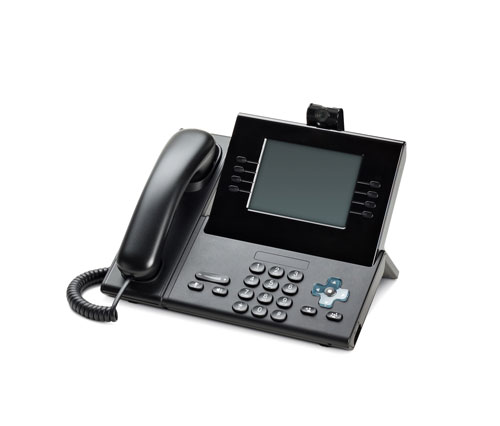The landline - old but gold?
How does a landline work?
The landline uses analogue telephone lines to send and receive calls. The connection is established using copper wires or fibre optic cables. These connect the landline telephone to the public telephone network.

Advantages and disadvantages
Thanks to the infrastructure of landline telephony, they are extremely reliable. They work even during power cuts, bad weather or natural disasters, as long as the telephone lines are not interrupted. However, this reliability also comes with a higher price tag. Setting up telephone lines in offices is expensive, inconvenient and the lines require regular maintenance. Rates are often expensive, especially for international calls, which is particularly onerous for international companies. In addition, landline telephones lack the necessary flexibility and functionality that today's working world demands.
Alternatives to the landline
As the name suggests, Wi-Fi telephony works via the Wi-Fi connection. On one hand, a landline number can be set up using the appropriate router and an app, which runs via the smartphone as soon as it is connected to the Wi-Fi. On the other hand, there are so-called Wi-Fi calls that run via the normal mobile phone number and only need to be activated via the settings.
Of course, calls can also be made via the mobile network. In addition to the normal mobile phone rates, users also have the option of setting up mobile landline numbers with their provider.
Making calls over the Internet is even easier with so-called Voice over IP services. Calls are made over an Internet connection.
VoIP - the future?
How does VoIP work?
VoIP is an internet-based telephone system that creates calls via the user's internet service. This can be done wirelessly via Wi-Fi or mobile data as well as via an Ethernet cable (LAN). Even if the connection between the two telephone extensions is different, they are fully compatible with each other. Just like a landline, every VoIP telephone connection has its own telephone number that can be reached by any other telephone device. These can be softphones (a computer programme for telephony), mobile devices or even landline telephones.

What kind of IP telephones are available?
Softphones are software-based VoIP telephones. The calls are made using a software programme. It is not necessary to purchase additional hardware. The softphone can be used as a programme via the computer or tablet and the integrated hardware (loudspeaker and microphone). However, any additional hardware can also be used, such as mobile phones or headsets.
The VoIP hardphone, or IP phone, looks more like a classic landline phone. However, the difference lies in the network connection, as the hardphones do not work via standard telephone lines, rather they are connected directly to the Internet. They also have an integrated mini-hub so that they only require one network connection together with a computer.
An ATA adapter is used to connect analogue telephones to a VoIP system. This enables Internet telephony even with a classic landline telephone.
Advantages and disadvantages
VoIP-based telephone systems offer many advantages, especially for companies, due to their wide range of functions. Faxes can be sent by telephone, calls can be answered for colleagues, telephone conferences can be held easily, voice dialogue systems can be set up and CRM systems can be integrated. Accessibility is also independent of location, which offers enormous advantages for home office and business trips. In addition, different networks can be combined and many services can be bundled and obtained from one provider. This not only leads to cost savings, but also simplifies conversions or system expansions. All data can be viewed via a customer account, making it easier to maintain an overview. The major disadvantage of VoIP telephony is its dependence on the power grid. If the router is no longer connected to the electricity supply, the internet connection and therefore the telephone connection will also be interrupted. In addition, the voice quality depends on the performance of the Internet.
VoIP providers
Modern VoIP telephone systems use a VoIP service or provider for voice and data transmission. There are numerous providers to choose from, which can be chosen individually depending on the company's requirements. Zoom Phone is a very well-known VoIP telephone system provider, but Placetel, 3CX or Wildix are also frequently used in office contexts. In private use, providers such as Skype or Whatsapp are more common.
Why we switched
We also switched to a VoIP telephone system as our previous telephone system was outdated and only offered limited configuration options. This meant that neither announcements nor queues or jingles could be recorded. The associated hardware telephones were also connected to the respective workstation, without the option of integrating apps or using the devices regardless of location. The VoIP telephone system offers us significantly more functions, customisation options and flexibility.
Conclusion
VoIP systems are increasingly dominating the market and are slowly replacing landline solutions in the corporate sector. The advantages of IP telephony outweigh the disadvantages, especially for medium-sized to large companies. However, the days of the landline network are not numbered yet. Especially in rural areas where no stable internet connection is available, landline phones are more suitable. So both apply: VoIP is the future of corporate telephony and at the same time the landline network remains a reliable goldie.
Would you also like to switch to a VoIP system? As experts in new and sustainable IT hardware, we will be happy to assist you with the purchase of your IP devices. You will find a large selection of communication solutions from leading brands such as Avaya and Alcatel-Lucent in our shop. You need support? Our sales team will be happy to help you with any questions or requests.
